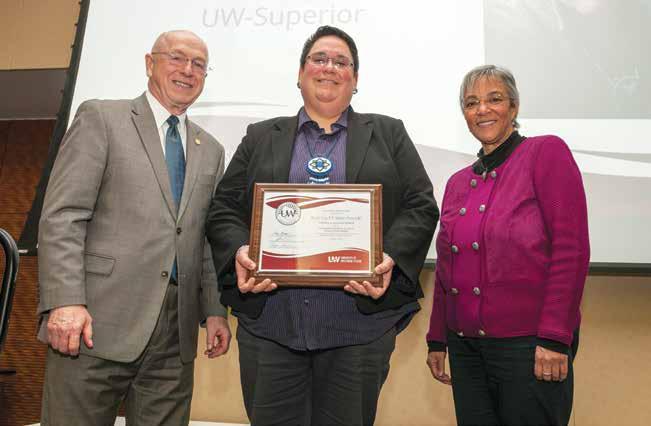
2 minute read
KATRINA ‘KAT’ WERCHOUSKI: A CHAMPION FOR DIVERSITY
By Andrea Busche
by UWS as the recipient of the Women in Color Education Award, which was a tremendous honor in her life.
Katrina
“Kat” Werchouski is a champion for people of all walks of life. She is a member of the Red Cliff Band of Lake Superior Ojibwe, with familial ties to the Leech Lake and Lac du Flambeau Ojibwe tribes, as well as the state of Jalisco, Mexico. She is a member of the LGBTQ community. And Werchouski is also a first-generation high school, and college, graduate.
While she can personally relate to the challenges faced by underserved populations, her philosophy is that of “people first,” before considering their backgrounds.
“Deep, human connection is crucial to me and how I go through life,” she said. “I recognize everyone as people first.”
As someone with such a rich, textured story, Werchouski seems to be the perfect fit for her job as director of Equity, Diversity and Inclusion at the University of WisconsinSuperior (UWS). Additionally, she was recently recognized
There is no doubt that Kat Werchouski is helping many students, and faculty for that matter, feel welcome and included at the university – exactly as they are.
Unique childhood
Werchouski was born in West Allis, Wis., a suburb of Milwaukee. While she has three older half-siblings, she was the only child in the house while growing up.
After her maternal grandmother became ill, her parents left their solid careers – her mom worked as a nurse for the VA, and her dad worked for the city – and the family moved to the Red Cliff Reservation. There, Werchouski’s parents cared for the family matriarch until her passing.
Although she has deep family ties to the Red Cliff Reservation, and her father is also an enrolled member of the Leech Lake tribe, Werchouski shared that she wasn’t raised with Native customs and traditions.
“There’s a misconception sometimes that Native people are really tied to their community. But our family didn’t really have that connection. My grandmother never really talked about ‘being Native,’” she said.
It was only after being enrolled in the Bayfield school district, and later in college, that Werchouski learned more about Native customs and traditions. While a public school, Bayfield’s student population is about 90 percent Native American, according to Werchouski. This introduction began a lifelong passion for connecting with her heritage, and learning more about indigenous people.
As a teenager, Werchouski worked an internship, followed by a regular position, as a national park ranger at Apostle Islands National Lakeshore in Bayfield. She also played clarinet in the band, and participated in a variety of science competitions. Werchouski graduated as valedictorian in her class. She was also a first-generation high school graduate in her family.
Higher education
Werchouski’s parents knew that college was expensive, but would somehow be attainable for their bright young daughter. They were right. With the guidance of one of her mentors, Rick Erickson, a science teacher at Bayfield High School, Werchouski was awarded the Bill Gates Millennium Scholarship, giving her a full-ride undergraduate college education.

She earned her degree, a B.S. in environmental studies (environmental public law and policy), from Northland College in Ashland, Wis. Later, she also earned a B.A. in Native American studies from the same institution. Werchouski then earned an M.S. in environmental studies (written communications) from Green Mountain College in Poultney, Vt.
For Werchouski, ongoing education remains an important part of her life. She is currently pursuing a doctoral degree (Ed.D. student affairs administration) from UW-La Crosse.
Work life
After spending 13 seasons (from age 14 to age 26) working as a park ranger, Werchouski got a job at her alma mater, Northland College, where she worked as the institution’s first Multicultural Programs coordinator, and later, director of the Indigenous Cultural Center.
“I learned a lot about culture, traditions and ceremonies there,” she said. “This was knowledge that I didn’t get from
Continued on page 12









